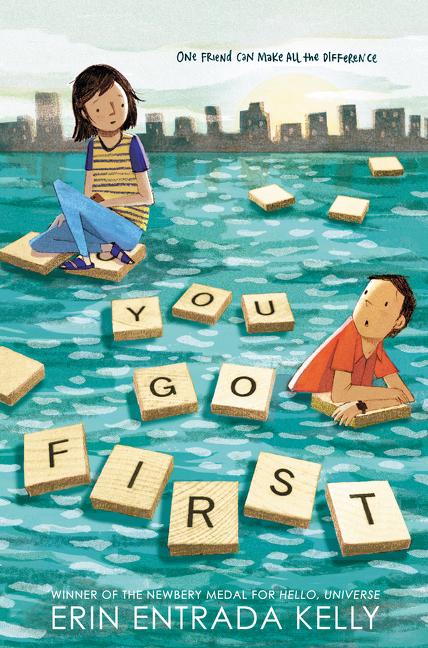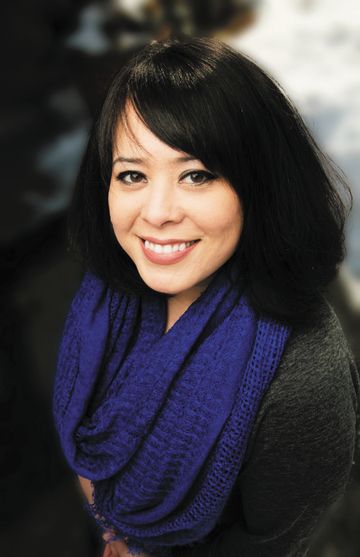Audiobook Excerpt narrated by Amielynn Abellera
You Go First |
Audiobook excerpt narrated by Amielynn Abellera.
Translate this transcript in the header View this transcript Dark mode on/off
Amielynn Abellera: Twelve year old Charlotte Lockard balanced an unopened Dr. Pepper upright on her hand and thought, "This is what it feels like to hold my dad's heart." She'd read online that the heart weighed about 12 ounces, same as the Dr. Pepper.
She was firmly rooted in the glow of a Crozier Hospital vending machine until a woman with tired eyes and gray hair said, "Excuse me." Charlotte mumbled a half apology and hurried back to the waiting room where her mother sniffled into tissues and blamed it on allergies.
Normally her mother wouldn't let her drink Dr. Pepper, but these weren't normal times. Two hours earlier, Charlotte had been in Life Sciences. A knock landed on Miss Schneider's door as Charlotte chewed the end of her pencil and stared at the discussion topic on her paper. There are about 1,500 species of starfish. They live primarily in the intertidal zone, which is also known as the literal zone or foreshore. Organisms along the intertidal zone are uniquely adept at surviving in harsh environments. Describe some characteristics of the intertidal zone versus the para tidal zone.
Charlotte had just finished writing. The intertidal zone is the area between the tides, i. e. it exists above water, at low tide and below water at high tide, which differs from the para tidal zone, a wider area that extends from above the highest tide level to below the lowest tidal level, when Miss Schneider called her name.
Miss Schneider, tall and lean, stood next to Miss Cottrey, the school counselor, who was short and round. They were opposite side by side, compare and contrast, and they were both frowning. "Did something happen to my dad?" Charlotte asked without getting up from her seat. She felt the other kid's eyes on her. That's when she decided she should probably stand up and follow Miss Cottrey out the door where she discovered the answer was yes.
He'd had a heart attack and crashed the car in front of Old Navy before being brought to Crozier Hospital for emergency surgery, and now she was here, drinking forbidden soda and watching her mother read US Weekly, which is something her mother would never read in real life, but Charlotte knew she wasn't really reading it because her reading glasses were perched on her head.
"Eyesight is the first thing to go after 50." Her mother always said, and Charlotte knew why. The lens of the eye hardened over time and made it difficult to focus, something Charlotte learned after she crawled into a rabbit hole. That's where her dad called it when she got swept up researching useless information online. "You've curled into your rabbit hole again," he would say.
Charlotte sipped her soda. She stared at the waiting room sign and thought, if you want to shuffle and rearrange some of the letters of waiting room, you get migration, which is kind of the opposite of waiting. It was a good word scramble, all things considered because her father loved birds. He'd joined a Birding club after he retired from teaching art history at Swarthmore College last year. Sometimes he veered off the sidewalk when he walked because he was too busy looking up. If there weren't any birds, he'd look at leaves instead. "Look at the shape of this one, Charlotte." He would say, a leaf in the center of his palm. "See how the lines branch off here, and see the fringe on the outside? Beautiful, isn't it? Art." And Charlotte would nod because she just wanted to get wherever they were going.
Flip, flip, flip. The sound of her mother with the magazine crawled under Charlotte's skin. Charlotte's mother was a statistician and usually hovered over information like a hawk, but she turned the pages so quickly that it was obvious she wasn't reading a word. She just needed to be busy. "Did you tell Bridget what happened?" Her mother asked. "Yes!" Bridget was her best friend. Of course, she'd told her. Charlotte slid down in her chair and stared at a discarded straw on the floor. "How long until dad gets out of surgery?" Charlotte asked. "I don't know." Her mother glanced at the clock on the wall. "Soon, I hope."
This audio excerpt is provided by HarperCollins.



